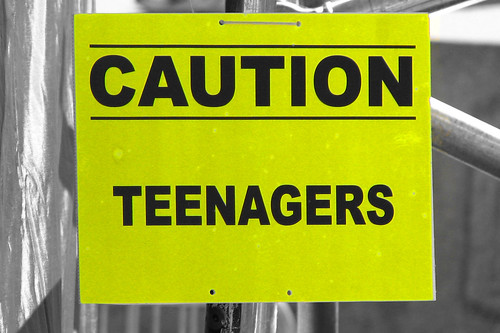 Caution Teenagers by CGP Grey
Caution Teenagers by CGP Grey http://www.cgpgrey.com/
This week we were required to ask a ‘young person’ some questions about popular culture. Unfortunately I don’t really know anyone from the ages of 13-19 so I took to the online world to ask some teenagers there. I used a forum on the
NaNoWriMo website to post my questions and received a wide variety of responses which I will discuss below. NaNoWriMo is short for National Novel Writing Month and is an international online gathering of people aiming to write at least 50,000 words during the month of November. The teenagers that replied to my thread are either aiming to write 50,000 words this year or have participated in earlier years. Obviously trying to write 50,000 words in a month isn't the typical goal for your every day teenager, but I think the answers I got from my teens were interesting nonetheless.
The questions I asked the teenagers are as follows:
1. Who is your favourite actor/actress at the moment? Why?
2. What is your favourite movie?
3. What is your favourite Young Adult novel?
4. Who is your favourite singer/band?
5. What do you think is the definition of "popular culture"?
6. How much time do you spend on the internet?
7. What are some popular trends you see at the moment? ie. clothing, accessories, etc.
8. What kind of social media do you use regularly? ie. Facebook, Tumblr, Twitter, etc.
9. Do you think role-playing/writing fan-fiction is educational? Why?
10. What do you think are the pressures that young people face in today's society?
You can view the answers to the thread here.
Unfortunately the above link is dead so
here is a link to the teenage forum I initially posted my question on.
It was interesting to read the definitions that young people had about popular culture. The majority agreed that it was a trend or something along the same lines that a large number of people followed. Other comments were made as to popular culture being something the media pressed upon the public, others said that popular culture was something that became very popular very quickly only to be forgotten a few weeks or months later. An interesting reply from someone named
Fantasy-Writer said that popular culture is the things they only know about because they are popular ie. Abbey Road, 'We Are the Champions', Romeo and Juliet. I liked that comment as a rebuttal to the idea that pop-culture is fleeting, Fantasy-Writer argues that popular-culture is something timeless.
I also enjoyed reading the answers to the question of what pressures young people face today. It was nice to get some candid responses about sex, relationships, school and family pressure, as well as pressure from the media. A comment by
consequenceofsounds highlighted the disillusionment some young people feel about being born in the 90's and not feeling valued by the rest of the world. There seems to be an awareness that growing up in a world surrounded by technology has it's benefits and curses.
I hope this thread continues to get replies because I enjoy reading them!


